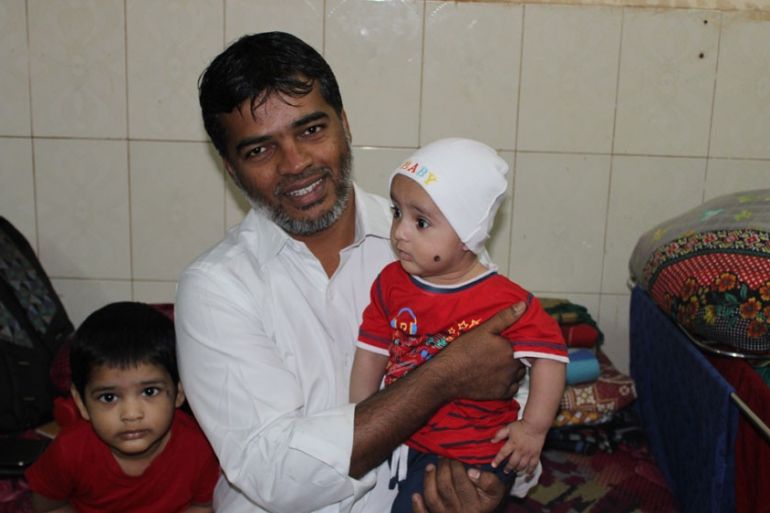Acquitted of terror, Wahid Sheikh campaigns for wrongfully jailed
Indian wrongly accused of and jailed for involvement in 2006 Mumbai train attacks now campaigns for falsely convicted.

Mumbai, India – In a two-room house in Amrut Nagar, a neighbourhood in eastern Mumbai, 40-year-old Wahid Bin Mohammad Sheikh sits on the floor looking at his ailing mother, lying on the bed.
“She is not keeping well since my arrest,” said Sheikh, who was arrested on September 29, 2006, by Maharashtra police in India in connection with the Mumbai train attack.
A series of train blasts on July 11, 2006, which lasted 11 minutes, left 188 people dead and over 800 injured.
The incident shook the country.
Four months after the incident, the Anti-Terrorism Squad (ATS) of the Maharashtra police named 30 people involved in the bombings.
Thirteen were arrested including Wahid Sheikh and the remaining 17, mostly Pakistani nationals, were declared as having absconded.
Sheikh was accused of being a member of the banned Students Islamic Movement of India (SIMI) and using his house for harbouring fighters from Pakistan who went on to plant bombs on the city’s local trains.
“We all were shocked when police arrested us and declared us terrorists,” Sheikh said. “We couldn’t even hire lawyers to defend the charges because in such cases, lawyers in Mumbai would charge huge money.”
Their families and relatives approached Jamiat Ulema-e-Hind, a Muslim civil rights group, for legal aid.
Nine years after the arrests, a special Maharashtra Control of Organised Crime Act Court (MOCAO) in September 2015 convicted 12 of 13 suspects.
The judge handed the death penalty to five and life imprisonment for seven others.
This policy of targeting a particular community has to be stopped because it's not good for the country.
Sheikh was the only person to be acquitted in the case.
“I spent nine years of my life in jail despite being innocent. My father died due to shock in 2007, my mother isn’t well today,” he said, “all because of the fake charges by police.”
He claimed that police tortured him to confess the charges.
“I suffered all three degrees of torture that the police use to force false confessions out of people,” he said.
“Electric shocks were given in my private parts and nipples. I would be asked to lie down on a table, my hands and legs would be tied, and then water was poured forcibly into my mouth. I would feel like as if I’m drowning in the sea.
“The police [are] creating terrorists. The police force people to take arms against the state.”
At the time of his arrest, Sheikh had worked as a teacher at a private school and was pursuing his PhD in Urdu from the University of Mumbai.
“I wanted to become a university professor,” said the father of four. “But the label of a terrorist was attached to my name.”
![Sheikh's mother Sajida, right, said she prayed for her son's release [Bilal Kuchay/Al Jazeera]](/wp-content/uploads/2019/03/cc0a4d1c0c554a09984b95b92f06ee54_18.jpeg)
His ailing mother, Sajida, said that she was finally happy.
“I was praying for his release all the time that was the only thing I could have done for my son’s release,” she said.
While in Mumbai’s Arthur Road Jail, Sheikh wrote a 400-page book titled Begunaah Qaidi, or Innocent Prisoner.
The book, which took 10 months to complete and is written in Urdu, was published in 2017.
Sheikh claims that a jail superintendent had at first attempted to stop him from writing.
“My trial ended in 2014 and the judgment was written a year later, so I collected all the documents and started [writing] the book. Before I walked out of jail, I had completed it,” he said.
“My book is not an autobiography. It’s a guidebook for other innocent prisoners fighting such cases. This is a book that talks about the police state, how innocent Muslims are falsely implicated in terror cases, how false witnesses are presented and how we were made to sign the confession statements.”
In jail, Sheikh also completed a Master’s degree in English, a diploma in journalism and began a law degree programme – which he completed last year.
Group calls for compensation
On October 2, 2016, Sheikh was among 15 people who gave evidence before a “people’s tribunal” organised by Innocence Network, an Indian collective which campaigns for people who have been wrongfully prosecuted in terrorism cases.
The tribunal released its report in December that year calling for Indian officials responsible for wrongful arrests and prosecution to be held accountable.
The report also said that the government should be made to pay compensation for wrongful convictions.
“I wasn’t given any compensation by the government for my nine years,” Sheikh said.
“But fortunately I got my job back. The school administration was kind enough that they offered me a job when I walked free, otherwise it’s very challenging for a person released from any terror-related case to get a job.”
Sheikh is now campaigning for the release of 12 men convicted in the case.
He visits universities and colleges across India, attends events and creates awareness.
“I’m convinced that they all are innocent and I will continue to campaign for their release. I will help their families in every possible way, be it monetarily or by campaigning for them,” he said.
“This policy of targeting a particular community has to be stopped because it’s not good for the country.”